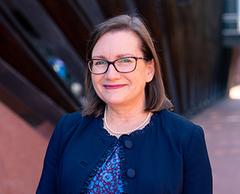Invited Speakers
PROF. DR. CAROLINE MANSFIELD
KEYNOTE SPEAKER
Professor Caroline Mansfields’ research focus is on teacher resilience and the personal and contextual resources that enable teachers to maintain engagement, commitment, and motivation, and thrive throughout their career. With her significant research in resilience, Caroline Mansfield has successfully led projects in teacher resilience and has already received awards for her remarkable achievement. Her knowledge and experience in resilience research and teaching makes Caroline Mansfield a significant contribution at ICM 2024.
TITLE & ABSTRACT
Teacher Resilience: Navigating challenges, harnessing resources in an increasingly complex profession.
Over the last decade teacher resilience has emerged as an important field of research, driven in part by an increasing societal focus on workplace wellbeing, the Covid-19 pandemic, and prevalent teacher shortages in parts of the world. Drawing on recent research, this presentation traces the conceptual development of teacher resilience research, examining the shift in focus from individualistic approaches to a broader socio-ecological perspective, considering the influence of school culture and educational policies on teacher resilience, and exploring the impact of programs and strategies to support teacher resilience. Moreover, the presentation offers valuable insights into the future directions of teacher resilience research, emphasizing its ongoing evolution in response to the ever-changing landscape of education and the well-being of educators. As the challenges and demands placed on teachers continue to evolve, so too must the strategies and support systems aimed at fostering their resilience.
PROF. DR. DAVID PUTWAIN
KEYNOTE SPEAKER

Professor Putwain’s interest in research focus on how psychological factors influence and in turn are influenced by learning and achievement with a particular focus on motivation, emotion, engagement and the learning environment. He is one of the developers of a cognitive-behavioral intervention for exam/test anxiety called STEPS (Strategies for Tackling Exam Pressure and Stress). With a quantity of publications and research in the fields of anxiety, emotion, and motivation in the school context, David Putwain is contributing to ICM 2024 in exciting and valuable ways.
TITLE & ABSTRACT
Test Anxiety: Deconstructing (Again) an Often Taken for Granted Construct
Test anxiety is a construct familiar to many educational scientists. However, whilst there is widespread awareness of the construct and how it can undermine learning and achievement, challenges remain in the definition and identification of test anxiety. I propose provocations on four conceptual issues that have potentially thwarted theoretical development in the field, and consequently, limited our understanding of the construct. Resolving these would expedite progress. First, there is a lack of clarity over the core dimensions of test anxiety resulting in confusion and jingle-jangle fallacies. Second, the status of test anxiety in relation to the anxiety disorders recognised in DSM-5 and ICD-11 is equivocal, leaving many unanswered questions. Can the disruption caused by severe test anxiety warrant a diagnosis; is severe test anxiety a disorder in its own right; is test anxiety a trigger for clinical anxiety? Third, the interpretation and consequential validity of test anxiety scores is not widely considered. There has been little consideration of the threshold for severe test anxiety and while creating cut scores from continuous distributions is controversial it would be assistive for practitioners. Fourth, there is an enduring belief that low to moderate levels of test anxiety can be motivating for performance, despite a lack of evidence to support this assumption. I propose a solution to resolving these issues is to adopt a construct validity approach grounded in theory. By doing so, we can bring clarity to the conceptualisation of test anxiety, answer important questions for researchers and practitioners, and provide insight into future directions of the field.
PROF. DR. LISA BARDACH
MID-CAREER SPEAKER
Lisa Bardach is an Assistant Professor at the Hector Research Institute of Education Sciences and Psychology at the University of Tübingen, Germany. Lisa Bardach’s research focuses on individual differences (e.g., motivation, personality, self-regulation, and cognitive abilities) and their interplay and role in individuals’ learning and development. Considering that children and adolescents are growing up in increasingly culturally diverse and often unequal worlds, she is also interested in questions relating to how schools approach cultural diversity and how they can address social inequities. Further, she conducts research on digital learning and develops interventions based on digital technologies to support children’s and adolescents’ positive school-related development.
TITLE & ABSTRACT
Revisiting intellectual investment trait theories in educational contexts
Intellectual investment trait theories posit that mutually reinforcing relationships exist between intellectual investment traits (selected motivational characteristics and personality traits such as interest, curiosity, need for cognition, or openness) and cognitive abilities. In this talk, I discuss recent research revisiting intellectual investment trait theories in educational contexts. First, I will present longitudinal evidence on reciprocal relations between intellectual investment traits and cognitive abilities in adolescence. I will discuss theoretical and methodological extensions that take into account the day-to-day dynamic interplay between investment states and cognitive performance states, thus moving from intellectual investment trait theory to dynamic intellectual investment trait and state theory. I will also refer to emotional experiences and argue that emotions play an important role for shaping reciprocities between cognition and investment traits, and, therefore, for our understanding of cognitive and motivational development. Then, I will cover research that aims to drill deeper into the mechanisms that underlie links between investment traits and markers of cognitive performance, focusing on behavioral traces of learning and information-seeking (e.g., online information search behavior, gaze patterns while individuals solve cognitive tasks, or engagement patterns derived from educational apps).
PROF. DR. DANIELA RACCANELLO
MID-CAREER SPEAKER
Daniela Raccanello, PhD, is Associate Professor in Developmental Psychology and Educational Psychology, and Director of the Centre of research in psychology “HEMOT – Helmet for EMOTions”, at the Department of Human Sciences, University of Verona, Italy. Since 2005, she has taught in Laurea degree, Master degree, and post-lauream courses. Her research areas include development of emotional competence, achievement emotions and motivation, and psychology of traumatic events. She is author of many publications indexed in Scopus and/or Web of Sciences and many books/book chapters, and she presented several works at national and international scientific conferences. She is the inventor of an Italian patent and holder of five European/British trademarks.
TITLE & ABSTRACT
Emotions: Gateways to learning and survival
My work is focused on how emotions play a role for behaviour in two important life areas: education and dealing with the experience of disasters. In the first case, how a person responds can mean the difference between academic success or failure. In the second, it can mean the difference between being a trauma victim or surviving relatively unscathed. The research I have conducted in each case has been directed at answering two broad questions–what aspects of a situation trigger specific emotions, and what role do these emotions play in shaping subsequent behaviour?
Pekrun’s control-value theory (2006) provided the theoretical basis for our research in educational contexts. The work my colleagues and I published in this area focused on how achievement emotions differed between students and across subject areas, cultures, and environmental settings. With an approach informed by science of resilience (Masten, 2021), we explored the role of emotions aroused by natural disasters like earthquakes and pandemics, technological disasters such as the Vajont Dam disaster in Italy, and violent acts such as the Paris and Bruxelles terrorist attacks and the Russia-Ukraine war.
Based on our research and extensive literature reviews, we have developed evidence-based tools for assisting adults and children to increase their resilience when faced with diverse challenges. These tools have been deployed in schools and the wider community using methods ranging from online training apps to public posters. More research is urgently needed to understand how to motivate and support people in strengthening community well-being.



